1. Sector Landscape and Outlook
Ever since the unfolding of coronavirus pandemic, everyday lives of many across the globe have been disrupted. Closer to home in Australia, households have been panic buying for necessities, which is adding tailwinds to consumer staple businesses that are having footprints domestically as well as globally. Markets have been exhibiting broad-based selloffs and volatility, which has resulted in market value erosion across the board including that of staple businesses as well. The benchmark S&P/ASX 200 index has seen its value eroded by over 30% in just over a month, qualifying this fall as one of the quickest falls ever. However, we note that some of the businesses in this segment would be amongst the ones delivering earnings growth (may be in a gradual manner) at a time when large part of corporate earnings may see dents in the near-term.
Present situation in the markets enables investors to increase stakes in the defensive businesses that are available at attractive valuations post continued volatility in the markets led by COVID-19. Policymakers have introduced measures to curb the collapsing economies around the world. Interest rate cuts, funding availability, credit, liquidity, targeted response for households, priority lending etc. – all of these measures bode well for the economy in general as well as consumer staples manufacturers.
As of 25 March 2020, COVID-19 has infected 375.498k humans, which has resulted in 16.362k deaths in 195 countries and territories. Below image shows parts of the world currently battling against COVID-19.
Fig 1: Coronavirus Impacted Regions
.png)
Source: World Health Organization
Coronavirus pandemic is disrupting businesses and households: As COVID-19 has been declared a pandemic by the World Health Organization, there is an urgency to contain the spread of the virus by the legislators, leading to widespread lockdowns and economic blockages. We entered the new decade with a sense of optimism fuelled by de-escalation in the Sino-US trade disputes and finalisation of the Brexit. However, 2020 saw the year begin with the news of Coronavirus erupting out of China. The Novel virus has disrupted the movement of goods and services in our extremely globalised world quickly- through hurting demand and supply concurrently; when China embraced a complete lockdown in the country, it led to interruptions in the global supply chains, but the country is now gradually coming back online.
Fig 2: COVID-19 and its headwinds and tailwinds
.png)
Source: Kalkine Research
Economists are pegging that the magnitude of recession invoked by the virus could be paramount. Since households are self-quarantining themselves across regions, the downside risks to discretionary spending are intensified. Nonetheless, the essential spending of households is likely to remain firm – given that essential stores, pharmacies are allowed to open. As households have been panicking and are on a buying spree, the demand for items like facewash, sanitisers, handwash, toilet paper, food etc. has increased, and it is likely to continue in a similar way until there is some relief from the coronavirus spread or lockdowns.
It is also important to note that an extended period of COVID-19 lockdowns across the world could trigger a fundamental shift in consumer habits, health consciousness, preferences, tastes, and spending. Companies with value-offering personal hygiene products, organic and natural products etc. could be one of the beneficiaries of this trend.
Consumers are turning cautious on their consuming habits increasingly: Consumer awareness is growing rapidly, and popular millennials (social media stars) are increasingly marketing new products on social media platforms as it has become a trend. Meanwhile, the Johnson & Johnson’s product led cancer saga had made consumer more cautious when buying personal care products. Natural and organic products have been catching the consumers eye lately. Numerous studies have shown that health conscious consumers prefer natural/organic based products. Innovative & research-driven companies are developing natural/organic based products be it an infant baby formula, dietary supplements, skincare, haircare, cosmetics, baby care, professional hygiene etc.
Fig 3: Changing consumer behaviour
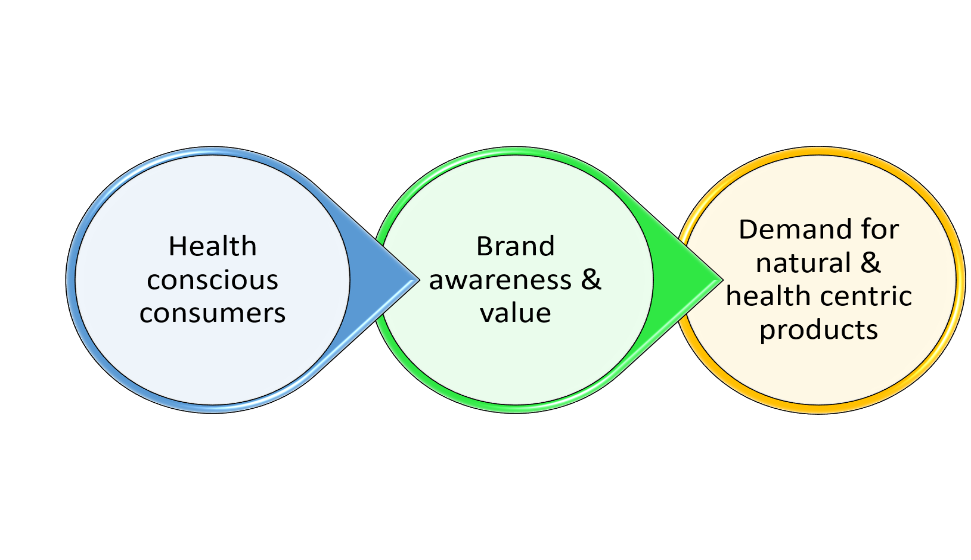
Source: Kalkine Research
At the backdrop of increasing risk to economic prosperity, nations are introducing policy measures, some of which could be beneficial for companies.
Low interest rates and low oil prices bodes well for companies: Policymakers have been launching responses to curb the widespread damage to their respective nations as well as global economy. Most of the Central Banks around the world are adopting easing stance through lowering interest, launching large scale asset purchases, and announcing targeted approaches for the affected pockets of economy. The Reserve Bank of Australia (RBA) has been targeting a yield for the 3-year AU Bond, which is directed to lower funding costs for businesses in Australia. Since more credit is being flown in the system, the companies with solid balance sheets could choose debt funding at a time when interest-rates are record low, thus making growth-funding relatively cheaper and increasing ROE.
As the RBA started yield-targeting, short-term yields & floating rates (BBSW) are coming down.
Fig 4: Short-term yields & floating rates

Source: RBA, ASX
Household and personal care products come in all shapes, which requires durable and quality packaging standards. Since oil prices have come down, the cost of oil-derivates used for packaging is likely to come down as a result of oil price plunge while global oil demand is likely to remain tepid unless we see substantial phasing out of lockdowns. Additionally, some companies are likely to optimise cost levels given that we have a looming recession, including delay in non-essential capital expenditures.
Essential retailers are operating, but non-essential retailers are largely closed across most of the countries. Therefore, businesses in the essential retail as well as manufacturers are likely to show resilience in revenues.
Consumer Staples segment expected to deliver top-line expectations: Countries have been following stringent measures to curb the spread of virus, which has initiated lockdowns of non-essential retail outlets across jurisdictions. However, the retail outlets that are selling daily use items such as grocery and pharmacies are unscathed. Sales of items such as milk, baby formula, butter, tissues, hand sanitisers, toilet papers etc. are likely to witness lesser disruptions due to COVID-19. This would lead to resilient demand for products manufactured by these companies, thereby leading to resilience in revenues and profits.
II. Investment Theme and Stocks under Discussion (BGA, BWX, FNP, A2M, AHY)
After gauging through the key trends, driver and stance, let’s take a detailed view of the companies in the sector in terms of their performance and outlook. To assess the same, companies’ stocks are evaluated based on Discounted Cash Flow (DCF).
1. ASX: BGA (BEGA CHEESE LIMITED)
(Recommendation: Buy, Potential Upside: 18%)
Bega Cheese has been serving Australians since 1899. It has a range of cheese products, spreads, dips, mayonnaise, dressings, bionutrients. Additionally, the company serves as a contract manufacturer to major global companies.
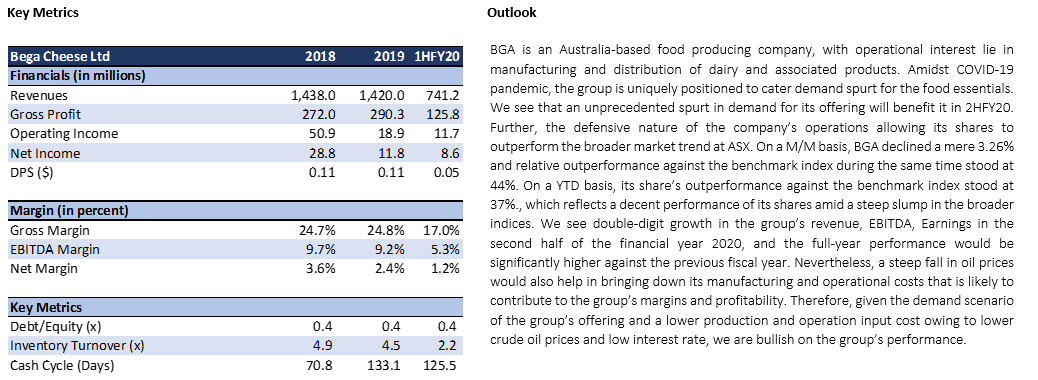
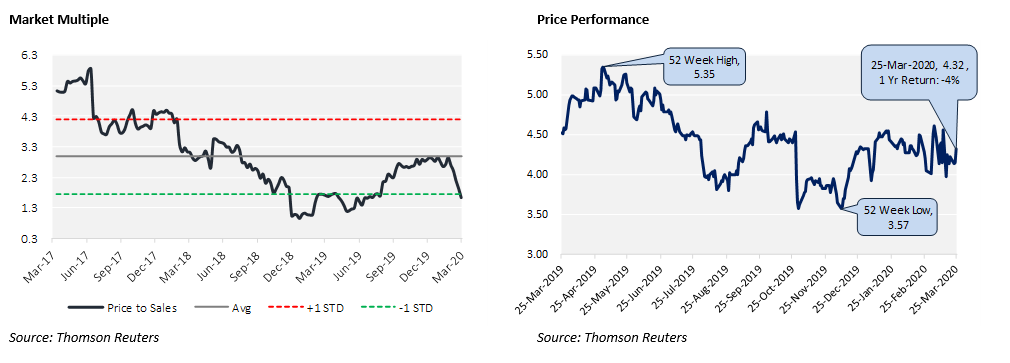
Valuation
Our valuation model suggests that stock has a potential upside of ~18% on 25 March 2020 closing price.
.png)
2. ASX: BWX (BWX Limited)
(Recommendation: Buy, Potential Upside: 19%)
BWX is positioned to leverage growth from wide footprint in global markets through its products line-up that includes natural skincare, natural cosmetics, health wellness and lifestyle.
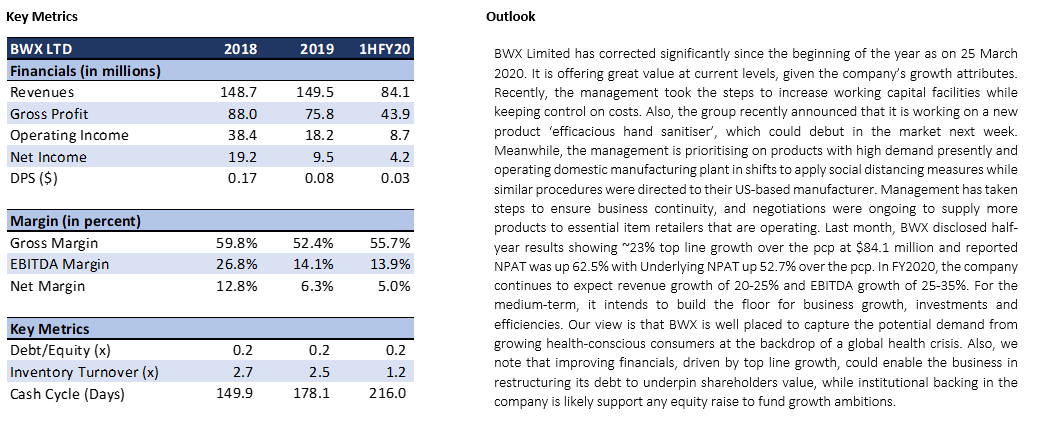
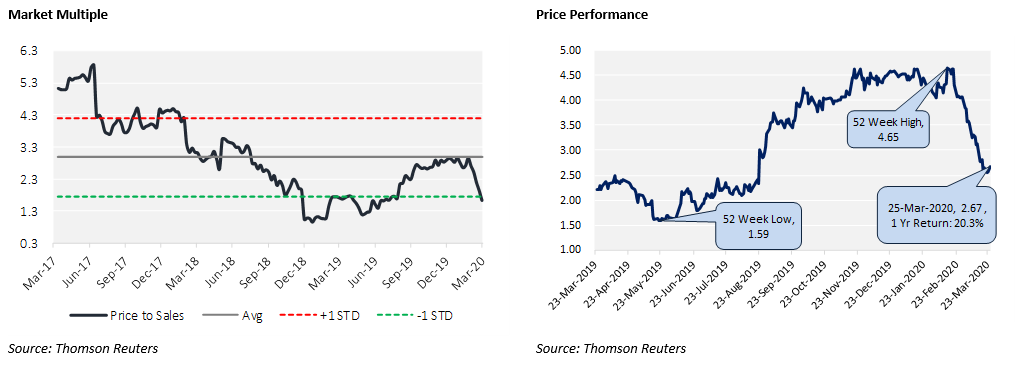
Valuation
Our valuation model suggests that stock has a potential upside of ~19% on 25 March 2020 closing price.
(36).png)
3. ASX: FNP (FREEDOM FOODS GROUP LIMITED)
(Recommendation: Hold, Potential Upside: 9%)
FNP is one of the Australia’s first movers in plant-based beverage in 1986. Presently, it has a long brand line-up, which includes Messy Monkeys, Heritage Mill, Brekky Heroes, Freedom Foods, Arnold’s Farm, Australia’s Own, Milk Lab, So Natural, Vital Life, Diamond Pro, Uprotein, Vital Strength and more
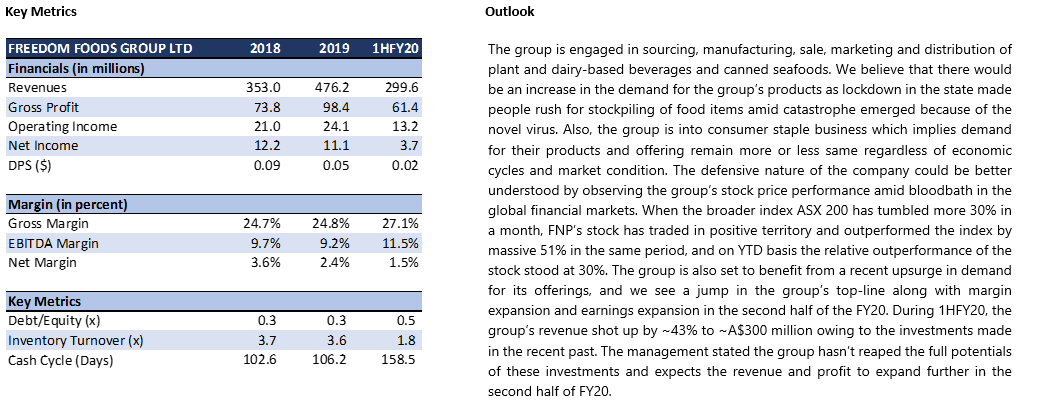
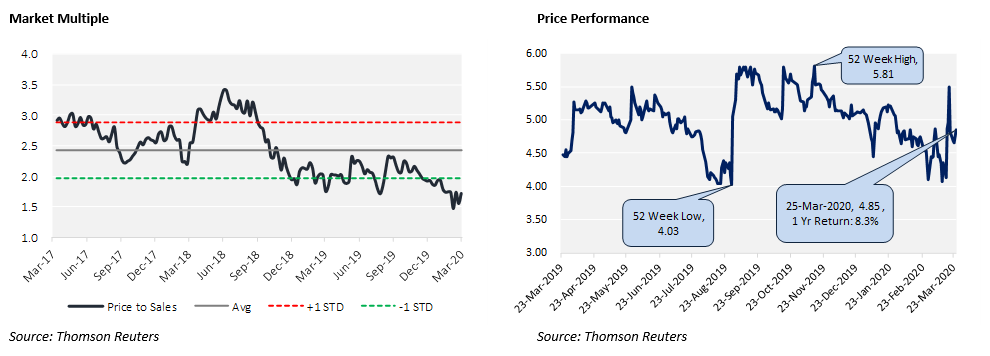
Valuation
Our valuation model suggests that stock has a potential upside of ~9% on 25 March 2020 closing price.
(22).png)
4. ASX: A2M (THE A2 MILK COMPANY LIMITED)
(Recommendation: Hold, Potential Upside: 8%)
A2Mhas main market presence in the US, Greater China, ANZ and it recently entered Canadian market via licensing. A2M’s major products include a2 MilkTM and infant nutrition.
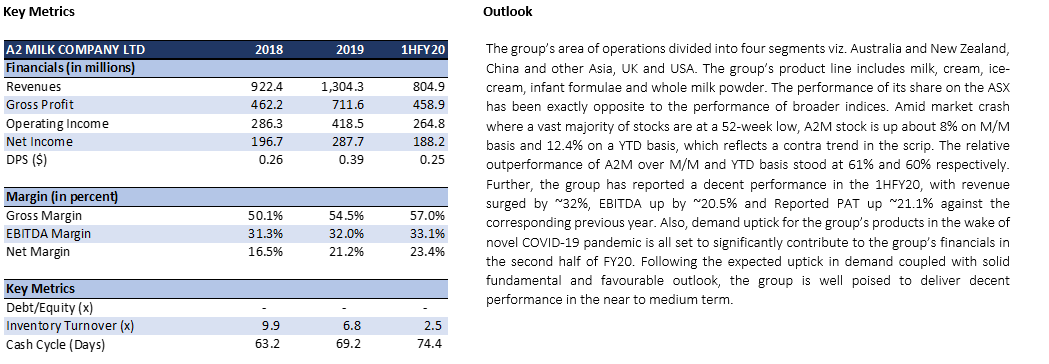
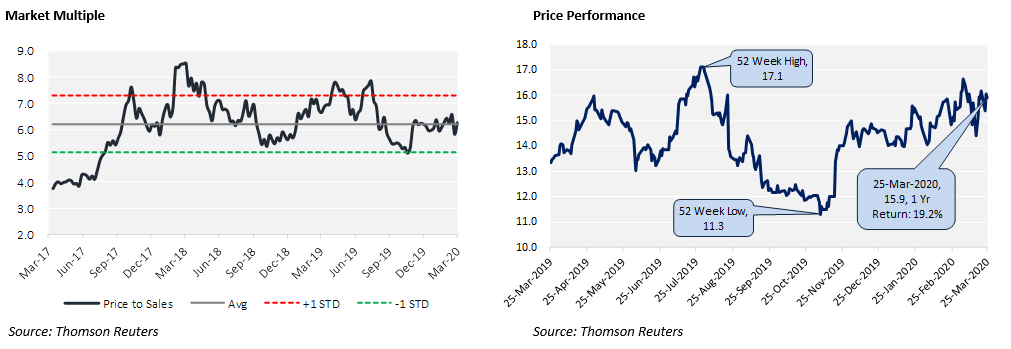
Valuation
Our valuation model suggests that stock has a potential upside of ~8% on 25 March 2020 closing price.
(12).png)
5. ASX: AHY (ASALEO CARE LIMITED)
(Recommendation: Speculative Buy, Potential Upside: 19%)
AHY serves businesses as well as households, and its offerings include toilet papers, table wares, incontinence healthcare, paper towels etc.
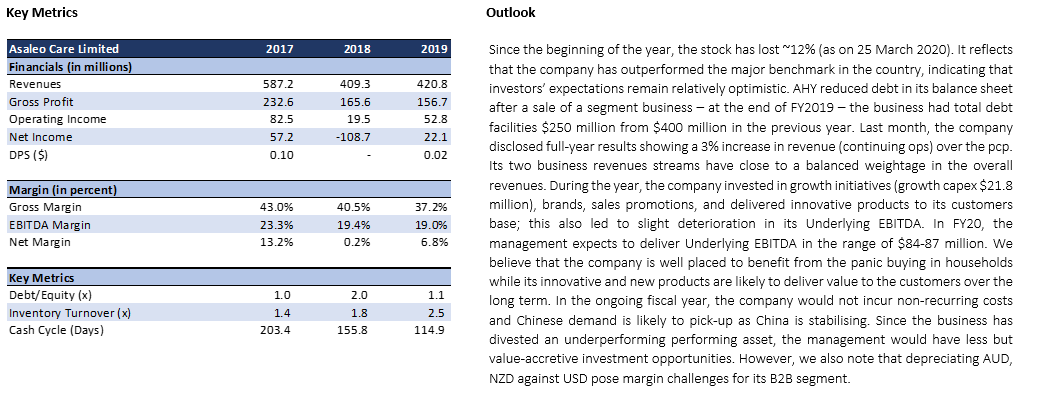
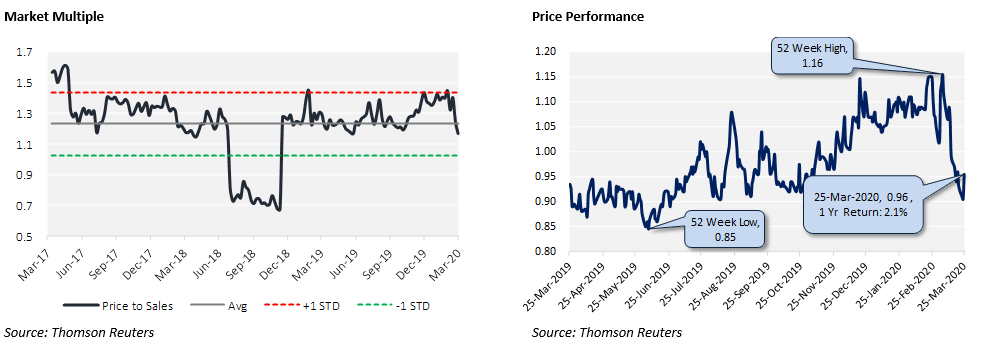
Valuation
Our valuation model suggests that stock has a potential upside of ~19% on 25 March 2020 closing price. Since the group’s revenue is significantly affected by forex fluctuations, we give a ‘Speculative Buy’ recommendation.
(5).png)
Note: All the recommendations and the calculations are based on the closing price of 25 March 2020, and hold the same, in view of stock price as at March 26, 2020. The financial information has been retrieved from the respective company’s website and Thomson Reuters
Disclaimer
The advice given by Kalkine Pty Ltd and provided on this website is general information only and it does not take into account your investment objectives, financial situation or needs. You should therefore consider whether the advice is appropriate to your investment objectives, financial situation and needs before acting upon it. You should seek advice from a financial adviser, stockbroker or other professional (including taxation and legal advice) as necessary before acting on any advice. Not all investments are appropriate for all people. Kalkine.com.au and associated pages are published by Kalkine Pty Ltd ABN 34 154 808 312 (Australian Financial Services License Number 425376). The information on this website has been prepared from a wide variety of sources, which Kalkine Pty Ltd, to the best of its knowledge and belief, considers accurate. You should make your own enquiries about any investments and we strongly suggest you seek advice before acting upon any recommendation. Kalkine Pty Ltd has made every effort to ensure the reliability of information contained in its newsletters and websites. All information represents our views at the date of publication and may change without notice. To the extent permitted by law, Kalkine Pty Ltd excludes all liability for any loss or damage arising from the use of this website and any information published (including any indirect or consequential loss, any data loss or data corruption). If the law prohibits this exclusion, Kalkine Pty Ltd hereby limits its liability, to the extent permitted by law to the resupply of services. There may be a product disclosure statement or other offer document for the securities and financial products we write about in Kalkine Reports. You should obtain a copy of the product disclosure statement or offer document before making any decision about whether to acquire the security or product. The link to our Terms & Conditions has been provided please go through them and also have a read of the Financial Services Guide. On the date of publishing this report (mentioned on the website), employees and/or associates of Kalkine Pty Ltd do not hold positions in any of the stocks covered on the website. These stocks can change any time and readers of the reports should not consider these stocks as personalised advice.
AU
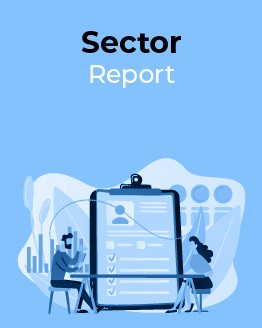
.png)
.png)




.png)


(36).png)


(22).png)


(12).png)


(5).png)
 Please wait processing your request...
Please wait processing your request...